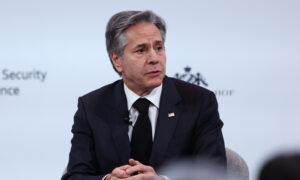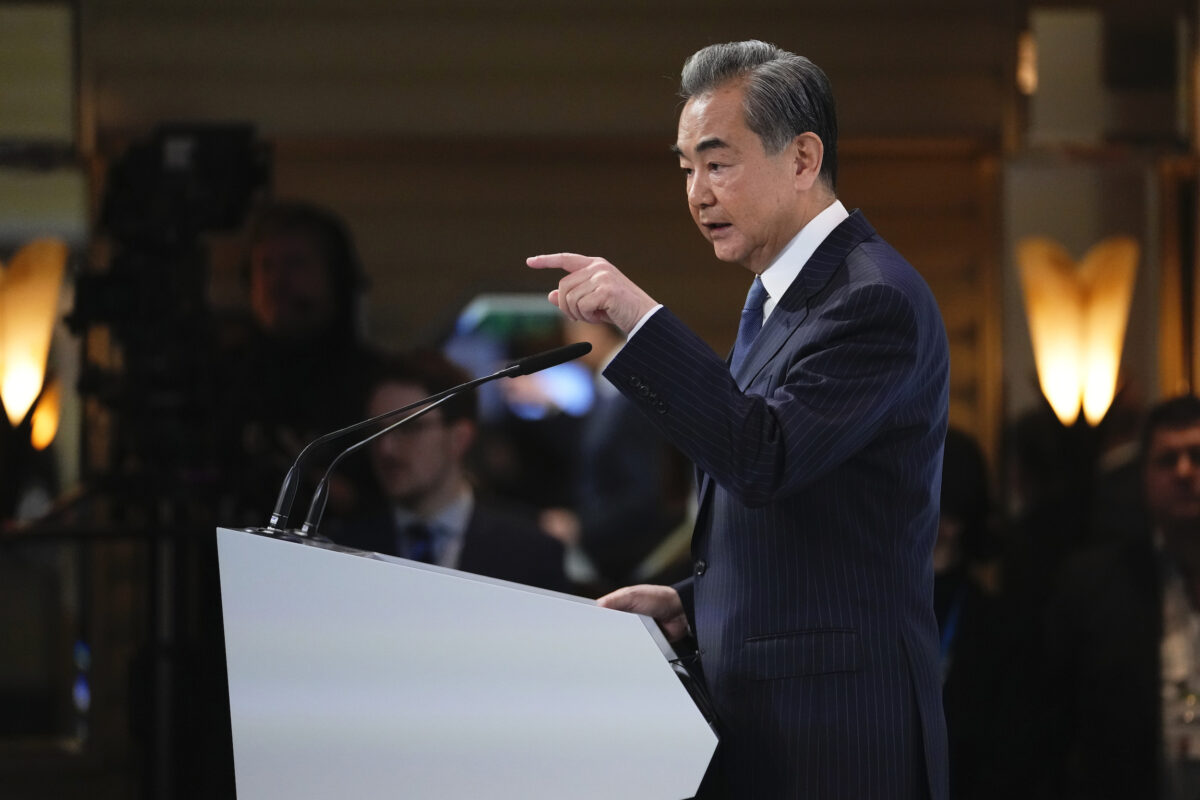US Condemns Chinese Spy Balloon Incursion in First in-Person Meeting
Secretary of State Antony Blinken condemned Beijing’s act of sending a surveillance balloon over U.S. airspace in the first bilateral meeting he had with his Chinese counterpart. “Just met with the PRC’s top diplomat, Wang Yi,” Blinken wrote on Twitter after their meeting on the sidelines of the Munich Security Conference. “I condemned the incursion of the PRC surveillance balloon and stressed it must never happen again. I warned China against providing [material] support to Russia. I also emphasized the importance of keeping open lines of communication.” Blinken told NBC News after the meeting that Wang, the Chinese state councilor and director of Beijing’s Central Foreign Affairs Office, gave “no apology” for the Chinese balloon incident. “There was no apology,” Blinken said. “But what I can also tell you is this was an opportunity to speak very clearly and very directly about the fact that China sent a surveillance balloon over our territory, violating our sovereignty, violating international law.” “And I told him quite simply that that was unacceptable and can never happen again.” The meeting marked the first face-to-face exchange between the two sides since the surveillance balloon incident set off an uproar in the United States and forced Blinken to cancel a planned visit to Beijing. That canceled trip would have been the first from a U.S. secretary of state to China in five years, which the administration had seen as a chance to smooth relations that already deteriorated after then-House Speaker Nancy Pelosi’s Taiwan visit. A readout from the State Department’s spokesperson Ned Price said that Blinken “made clear the United States will not stand for any violation of our sovereignty, and that the PRC’s high altitude surveillance balloon program—which has intruded into the air space of over 40 countries across 5 continents—has been exposed to the world.” Noting North Korea’s “destabilizing act” of testing an intercontinental ballistic missile on Saturday, Blinken “emphasized the need for responsible powers to respond to such significant international challenges,” according to the statement. Blinken also stressed that the China policy remains unchanged and urged for “peace and stability across the Taiwan Strait” as concerns mount that the Chinese regime could attack the self-governing island. Beijing had insisted that the United States formally initiate the meeting, Politico reported, citing an anonymous Washington diplomat. Blinken made a request but received no response from China before boarding the Munich-bound flight on Thursday, according to the report. At the Munich conference prior to the meeting, Wang had turned up the heat on Washington, repeating the regime’s claims that the U.S. decision to have a fighter jet shoot down the balloon in U.S. airspace was “absurd, almost hysterical.” He demanded the United States “correct its mistakes” to “show sincerity.” China’s Director of the Office of the Central Foreign Affairs Commission Wang Yi speaks at the Munich Security Conference in Munich, on Feb. 18, 2023. (Petr David Josek/AP Photo) Hours after Wang’s comments, Blinken left his Munich hotel to an undisclosed location, ignoring a shouted question from a reporter about whether he was going to meet with Wang as he entered his vehicle at the hotel garage. The Biden administration earlier in the month said the Chinese balloon that flew for more than a week over the U.S. airspace was part of a global surveillance program that affects more than 40 countries, including Washington’s “closest allies and partners.” But both President Joe Biden and administration officials have stressed that they want to maintain the communication lines open and aren’t looking for conflicts. “I expect to be speaking with President Xi, and I hope we are going to get to the bottom of this,” Biden told a Feb. 16 news conference, although he added he makes “no apologies for taking down that balloon.” “We’ll also continue to engage with China, as we have throughout the past two weeks,” he said. Blinken reiterated Biden’s statements at the meeting with Wang, saying that “the United States will compete and will unapologetically stand up for our values and interests, but that we do not want conflict with the PRC and are not looking for a new Cold War,” according to Price. “The Secretary underscored the importance of maintaining diplomatic dialogue and open lines of communication at all times,” said Price. The State Department directed The Epoch Times to the official statement when asked about the meeting. This article has been update to include further remarks from the meeting.

Secretary of State Antony Blinken condemned Beijing’s act of sending a surveillance balloon over U.S. airspace in the first bilateral meeting he had with his Chinese counterpart.
“Just met with the PRC’s top diplomat, Wang Yi,” Blinken wrote on Twitter after their meeting on the sidelines of the Munich Security Conference. “I condemned the incursion of the PRC surveillance balloon and stressed it must never happen again. I warned China against providing [material] support to Russia. I also emphasized the importance of keeping open lines of communication.”
Blinken told NBC News after the meeting that Wang, the Chinese state councilor and director of Beijing’s Central Foreign Affairs Office, gave “no apology” for the Chinese balloon incident.
“There was no apology,” Blinken said. “But what I can also tell you is this was an opportunity to speak very clearly and very directly about the fact that China sent a surveillance balloon over our territory, violating our sovereignty, violating international law.”
“And I told him quite simply that that was unacceptable and can never happen again.”
The meeting marked the first face-to-face exchange between the two sides since the surveillance balloon incident set off an uproar in the United States and forced Blinken to cancel a planned visit to Beijing.
That canceled trip would have been the first from a U.S. secretary of state to China in five years, which the administration had seen as a chance to smooth relations that already deteriorated after then-House Speaker Nancy Pelosi’s Taiwan visit.
A readout from the State Department’s spokesperson Ned Price said that Blinken “made clear the United States will not stand for any violation of our sovereignty, and that the PRC’s high altitude surveillance balloon program—which has intruded into the air space of over 40 countries across 5 continents—has been exposed to the world.”
Noting North Korea’s “destabilizing act” of testing an intercontinental ballistic missile on Saturday, Blinken “emphasized the need for responsible powers to respond to such significant international challenges,” according to the statement. Blinken also stressed that the China policy remains unchanged and urged for “peace and stability across the Taiwan Strait” as concerns mount that the Chinese regime could attack the self-governing island.
Beijing had insisted that the United States formally initiate the meeting, Politico reported, citing an anonymous Washington diplomat. Blinken made a request but received no response from China before boarding the Munich-bound flight on Thursday, according to the report.
At the Munich conference prior to the meeting, Wang had turned up the heat on Washington, repeating the regime’s claims that the U.S. decision to have a fighter jet shoot down the balloon in U.S. airspace was “absurd, almost hysterical.” He demanded the United States “correct its mistakes” to “show sincerity.”

Hours after Wang’s comments, Blinken left his Munich hotel to an undisclosed location, ignoring a shouted question from a reporter about whether he was going to meet with Wang as he entered his vehicle at the hotel garage.
The Biden administration earlier in the month said the Chinese balloon that flew for more than a week over the U.S. airspace was part of a global surveillance program that affects more than 40 countries, including Washington’s “closest allies and partners.”
But both President Joe Biden and administration officials have stressed that they want to maintain the communication lines open and aren’t looking for conflicts.
“I expect to be speaking with President Xi, and I hope we are going to get to the bottom of this,” Biden told a Feb. 16 news conference, although he added he makes “no apologies for taking down that balloon.”
“We’ll also continue to engage with China, as we have throughout the past two weeks,” he said.
Blinken reiterated Biden’s statements at the meeting with Wang, saying that “the United States will compete and will unapologetically stand up for our values and interests, but that we do not want conflict with the PRC and are not looking for a new Cold War,” according to Price.
“The Secretary underscored the importance of maintaining diplomatic dialogue and open lines of communication at all times,” said Price.
The State Department directed The Epoch Times to the official statement when asked about the meeting.
This article has been update to include further remarks from the meeting.












